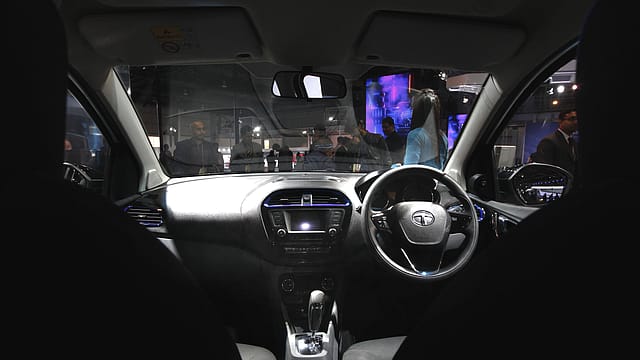When vehicles go digital
ADVERTISEMENT

An auto show is a periscope that lets one see the future, at least the possibility of it. So, automakers, big and small, were keen to showcase their technological progress as the 2018 Auto Expo began in Greater Noida on Wednesday. Expectedly, electric vehicles were the talk of the town. But automotive innovation isn’t just about what powers our vehicles, how our vehicle interacts with us is important too.
Thus, be it the new concept cars of Tata Motors—the Land Rover Discovery-inspired H5X and the 45X, the next-gen small car—or the Creon electric scooter concept TVS showcased, all of them envision a world in which you would communicate with your vehicle as you would with a smartphone. Creon, for instance, is an electric scooter with a digital console inspired by your phone. The scooter will also have a compatible mobile app that offers you information such as the charge left in the battery and so on. Tata’s idea of the future goes further—you can talk to your car to perhaps set a destination. The company calls it smart mobility for smart cities.
But automakers are not technology companies. The need for connected vehicles, where your car or bike links with your smartphone, smart home, and smart office for a seamless transfer of information, means technology companies have an attractive market to tap into. And companies such as Harman, owned by Samsung, are keen to capitalise.
January 2026
Netflix, which has been in India for a decade, has successfully struck a balance between high-class premium content and pricing that attracts a range of customers. Find out how the U.S. streaming giant evolved in India, plus an exclusive interview with CEO Ted Sarandos. Also read about the Best Investments for 2026, and how rising growth and easing inflation will come in handy for finance minister Nirmala Sitharaman as she prepares Budget 2026.
Harman, which for decades has had a presence in the auto sector through its Harman Kardon - and JBL- branded sound systems, wants to provide car makers with “digital cockpits”. The infotainment system that it makes for automakers such as Tata Motors is only a start. Digital cockpits, as the company sees it, will go beyond just placing an interactive touchscreen in a car.
“Cars, in effect, are in a virtual island,” says Arvin Baalu, vice president, digital cockpit platform group, Harman International. “The experience it offers today is very heterogeneous.” In other words, cars of today have failed to connect to the digital world we are in. Harman, thus, wants a homogenous link between the car, the cloud, your phone, and whatever device you use in the future.
There is a reason for Harman’s confidence. With the company now coming under the umbrella of the Samsung Group, it can tap into the hardware and technology prowess of the South Korean giant, not to mention its financial strength. In fact, Harman’s focus on the auto sector was considered the prime reason behind its acquisition by Samsung.
“For instance, Samsung has a strong presence in display, in OLED and QLED. We are able to leverage that to produce premium infotainment solutions. For instance, the latest Maserati car has a high resolution infotainment system with 3D graphics,” he said. Italian performance car maker Maserati showcased its new Levante model, decked with the latest technologies, at the Geneva Auto Show recently.
Harman says such innovations do not have to be restricted to premium cars. “In fact, cost efficiency is one of our strength. The partnership we have had with Tata Motors have brought out premium features in models such as the Tiago,” he says.
Baalu says Indian automakers are keen to showcase more features in affordable cars too, and Harman’s expertise in frugal innovations could help them.
Indeed, going by the concept cars and even upcoming production-ready cars automakers are showcasing at the Expo, connected cars may well be the future before electric cars.
